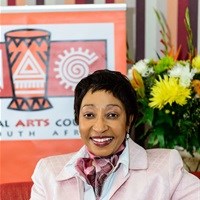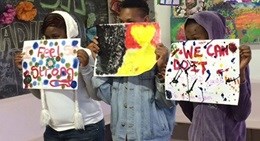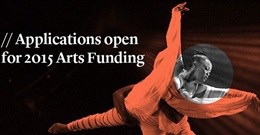I found out about the NAC's R9m funding to 13 flagship arts organisations, especially as the arts are media-painted as 'underfunded' and the NAC itself is non-profit making.
The National Arts Council (NAC) has just announced R9m funding to thirteen flagship arts organisations. Commenting on the range of funding granted, CEO Rosemary Mangope said, "The NAC is confident that the skills development focus of many of these projects will not only help numerous South Africans to become the educators, performers and producers of tomorrow, but also that the engaging and fresh approach brought by all these companies will nurture long term audience development, ensuring equal access to and enjoyment in the arts for all."
That's certainly a promising premise. I chatted to Mangope about the funding, what it means to the arts industry as well as the NAC's bigger vision for the arts industry.
Tell me about your 30-year career and how you became CEO of the NAC.
Mangope: Before joining the NAC, I worked for the Development Bank of Southern Africa in a senior public affairs role. My brief was largely focused on strategic leadership and guidance across the organisation's communications and marketing initiatives.
Prior to that I founded and directed the Arts, Social Development and Youth Division at the Department of Arts and Culture (DAC) and, during my final year at the DAC, I was Acting Deputy Director General. So when the opportunity to apply for the CEO role at the NAC came up, I saw it as a logical transition.
I have witnessed first-hand the power of the arts in achieving lasting growth and transformation for individuals and communities. The arts have always been close to my heart and I see my role at the NAC as central to their development in South Africa.
What are your favourite things away from work?
Mangope: Reading, entertaining and enjoying meaningful conversations with friends over dinner; hosting and entertaining those I care for; spending time with my family, friends and young people. I also love listening to music and my current favourite is The Bandstand with Eleanor Moore on Saturday nights on 702.
You speak an impressive seven of SA's 11 official languages - does this help in expanding the NAC's focus across the country?
Mangope: Absolutely! The ability to speak to people in their own language is crucial; it breaks down barriers and allows people to really engage. I'm always happy to speak to vernacular radio stations and regional journalists to get the message about the NAC's work out to all corners of the country. We want to ensure real representation in terms of the projects we fund nationally.
Talk about your time as Executive Director of the Mmabana Cultural Foundation.
Mangope: In the mid-80s, I played a central role as the founding Executive Director of the Mmabana Cultural Foundation in the North West Province, which used theatre, dance, sports and art to build self-esteem among children and communities. The Foundation led to the establishment of the Bop Arts Council, which spearheaded cultural development in the province. It was a really stimulating and fulfilling time for me in terms of my career - every day was rewarding, watching people come into their own, gain confidence, excel and realise their gifts and creativity. So in a sense my career has come full circle now that I'm working at the NAC in a very active arts environment.
Tell us more about the Little Voices Choral Festival and what this means for the education system.
Mangope: This programme is a dream come true for me in terms of ensuring that children are exposed to creativity at a young age. The festival will target learners from the ages of three to six. It will be growing and developing audiences for the arts from a very early stage and I'm very excited about seeing it roll out via Early Learning Centres across SA. We are currently in conversation with our provincial partners - the Eastern Cape being one of these - to pilot the programme.
Now for more on the NAC - how does it work and which arts fall under the NAC umbrella?
Mangope: The NAC has seven disciplines: dance, theatre, music, literature, crafts, multi-discipline and visual arts. It's a funding organisation, under the umbrella of the DAC, with a mandate to develop, support, promote and advance the arts both nationally and, via strategic partnerships, internationally. We fund arts organisations and individuals on an annual basis - we've just opened our 2015 applications for funding, including bursary funding for students who wish to further their arts studies overseas.
How do young people, marginalised and previously disadvantaged groups benefit from the NAC?
Mangope: Our funding model aims to ensure those previously marginalised and disadvantaged are prioritised; 50% of all our funding is targeted towards emerging artists and organisations (medium-term multi-year funding); 30% is set aside for intermediate or mid-career artists and organisations and 20% is designated for established artists and organisations.
The arts are often painted as 'underfunded' by the media. How did the NAC's R9m funding to thirteen flagship arts organisations come about?
Mangope: As a result of the availability of unclaimed funds, the NAC was able to make funding available to projects that will meet the organisation's strategic goals. Note that the NAC is a non-profit making organisation. The thirteen projects funded are wide-ranging and will roll out nationally and locally. They range from new resources from the South African Book Development Council in indigenous languages to a multi-stranded project for young musicians with the Eastern Cape Philharmonic Orchestra. Many will impact on young people, marginalised and previously disadvantaged groups by facilitating access to the arts. You can read all about them on our website.
How were the flagship organisations, which will benefit from the funding, selected?
Mangope: All the projects were assessed and evaluated by our panel of experts - all of whom are practitioners - against a range of criteria. They all have a proven track record in their field and within the communities they serve. The work they do, and the projects that have been identified, also support the NAC's enhanced strategy.
 What will the long-term impact of this be for the arts industry?
What will the long-term impact of this be for the arts industry? Mangope: We are always striving for focused and sustainable growth across all the creative disciplines we cover. Each of the special projects had to provide us with a rationale outlining how their specific project would contribute to skills development and many of these projects will help numerous South Africans to become the educators, performers and producers of tomorrow. We were also looking for an engaging and fresh approach to nurturing long-term audience development. We want to ensure equal access to, and enjoyment of, the arts for all.
What's the state of the local arts industry at the moment? Where are we seeing success and where do we need more focus?
Mangope: At the moment I feel the local arts environment is too fragmented and various organisations and arts practitioners are not leveraging off each other as much as they could. We need increased focus on collaboration, on knowledge-sharing and on identifying resources that will have a positive effect on how all arts organisations work. There are many great successes we can celebrate, but we also need to ensure we learn from them and, hopefully, enable them to easily and effectively share their expertise with others, so we are constantly upskilling across all the creative industries.
Please discuss the NAC's bigger vision for the arts industry.
Mangope: The NAC needs to move from being a stand-alone agency towards a far more holistic role - we need to be an inter-connected part of the arts and culture ecosystem in South Africa. I'm moving into my second year as CEO and over the next twelve months I see collaboration with key stakeholders within SA, including government departments such as health and basic education, as crucial.
I'm also very focused on consolidating the NAC's international remit. We are currently driving the Canada Stage: Spotlight on South Africa season, which will see over 60 SA artists performing and presenting a range of work in Toronto in April 2015. This builds on the unparalleled success of the South Africa-France Season 2012/2013 when 115 projects took place across SA, and over 250 projects and events took place in France. The NAC and ASSITEJ SA also announced a flagship three-year partnership in 2014, leading to the hosting of the 19th ASSITEJ World Congress in Cape Town in 2017, focusing on theatre for children and young people.
Overall, I would say my vision is for the NAC to have a sustainable impact both nationally and internationally over many years to come.
Read more about the work of the NAC, including how to apply for project and bursary funding for 2015, by clicking here, and keep up with the latest from the NAC on Twitter.




































 What will the long-term impact of this be for the arts industry?
What will the long-term impact of this be for the arts industry? 

